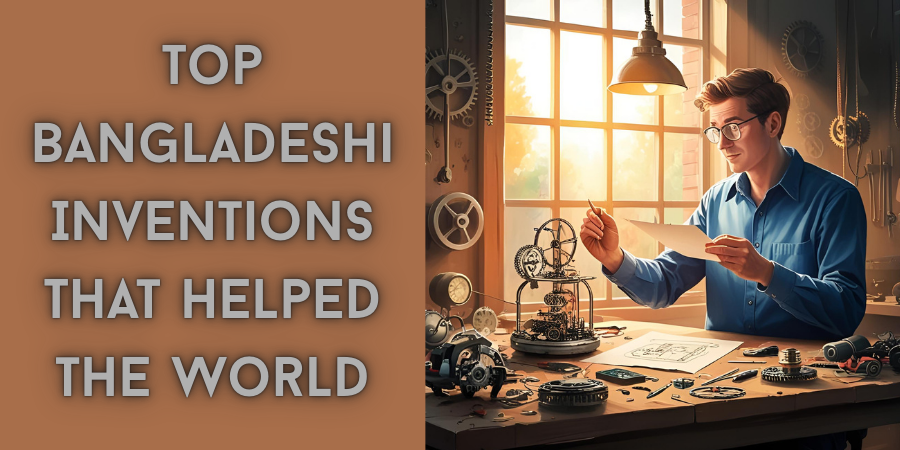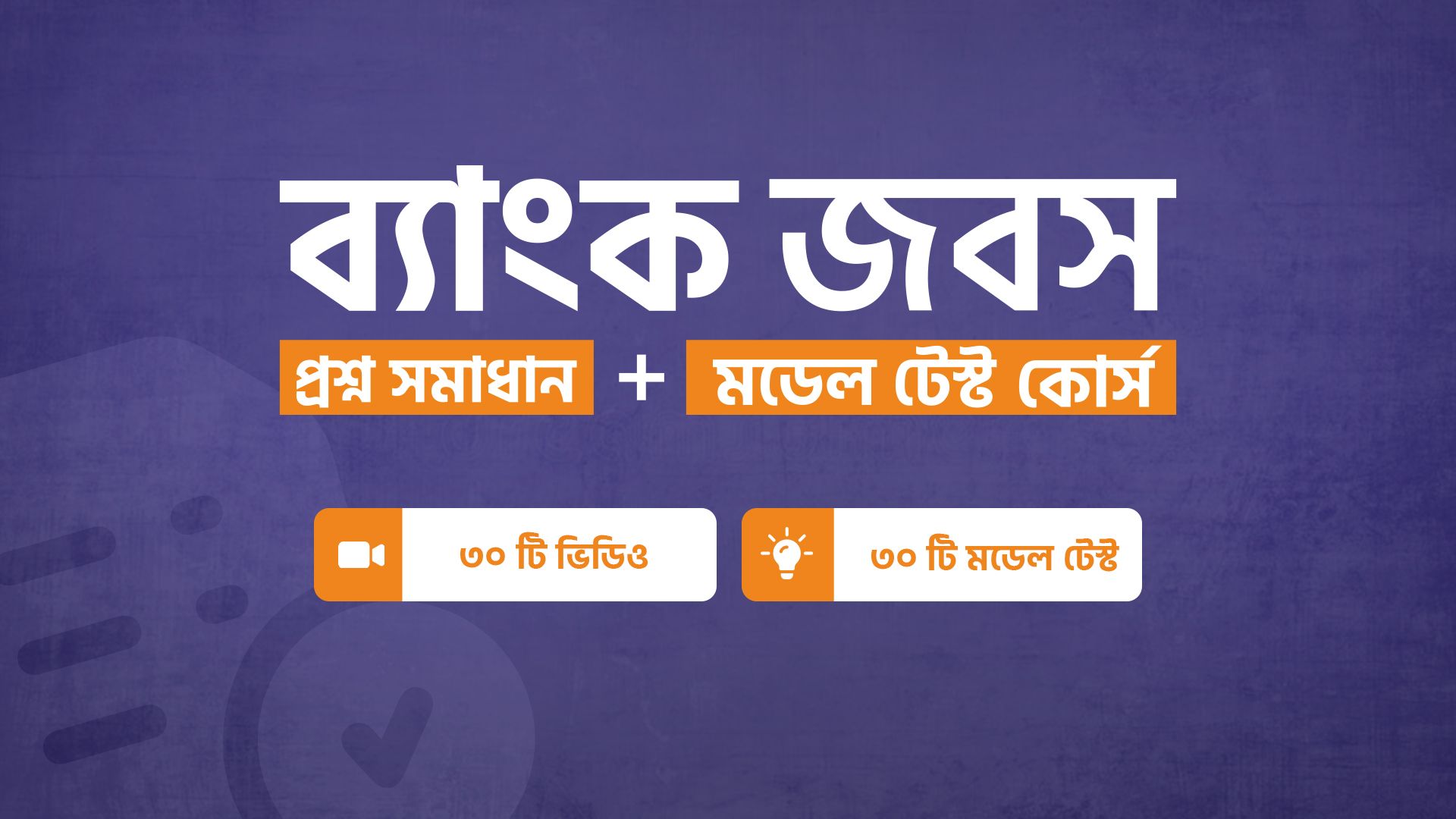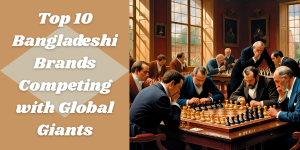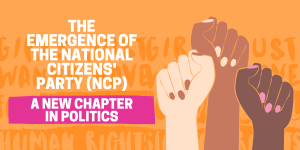Top Bangladeshi Inventions That Helped the World
BY
Mitu
When inventors think about those who have revolutionised their world, usually names like the United States, Japan, or Germany come to mind. Bangladesh — the "dark horse" of nations — invented world-changing innovations that had a great impact on global health, education, finance, and sustainability.
From saving lives with a hassle-free oral solution to making a revolutionary change in financial inclusion, Bangladeshi inventors and institutions have made history in some way. This article brings to light the most registered Bangladeshi inventions, which have been used by millions of people around the world.
1. Oral Rehydration Solution (ORS)
By Dr Dilip Mahalanabis (ICDDR, B), during the cholera epidemic of 1971 in the refugee camps.
Backed by: International Centre for Diarrhoeal Disease Research, Bangladesh (ICDDR, B)
Impact: Above 70 million lives saved so far around the world.
International Acceptance: WHO, UNICEF, and over 100 other nations worldwide endorse it.
Formula: A very simple mixture of salt, sugar, and clean water.
Fun Fact: Despite its simplicity, ORS is arguably among the most effective and cost-efficient medical treatments in human history.
2. Microcredit by Dr. Muhammad Yunus & Grameen Bank
Inventor: Nobel Laureate Dr. Muhammad Yunus
Founded Grameen Bank: 1983
Innovation: Providing small, collateral-free loans to the rural poor
Impact: About 100+ countries have helped millions escape poverty, especially women.
Awards: Nobel Prize in Peace (2006), Presidential Medal of Freedom (USA), and many others
Fun Fact: The model of microfinance inspired replication in places like India, Africa, Latin America, and even in inner cities of the U.S.
3. Sonali Bag - Jute Bio-Plastic Inventor:
Dr. Mubarak Ahmad Khan, Bangladesh Jute Mills Corporation
Product: Sonali Bag - "Golden Bag" in Bengali
Material Used: Biopolymer extracted from jute cellulose.
Purpose: Packaging and shopping bags, etc. World at its disposal: UK, Japan, Malaysia, and several EU countries.
Why it matters: Known once as "Golden Fibre", jute is now, ironically, a strand in the victory over huge global plastic pollution win for sustainability.
4. Solar Home Systems by Grameen Shakti Organisation: Grameen Shakti (a member of the Grameen family)
Impact: Now, solar electricity is brought to over 2 million rural households in Bangladesh.
Use: Lighting, phone charging, and small appliances.
Model: This model has been adopted in Kenya, Uganda, and Nepal.
Award: Ashden Award for Sustainable Energy.
Why it matters: It is a real-world example where on-grid access to renewable energy is changing lives through clean energy.
5. Ultra-Poor Graduation Program by BRAC
Founder: Sir Fazle Hasan Abed, BRAC
Objective: Work with the very poor to help them achieve sustainable livelihoods.
Activities: Asset transfer, training, healthcare, saving habits, mentoring
Success Rate: 95 %+ of participants lift themselves above extreme poverty.
Adopted By: Governments and NGOS in Ethiopia, Pakistan, Rwanda, Philippines.
Why it matters: It is widely accepted as one of the most effective responses to poverty in the world.
6. AI-Powered Inventory Acquisition System at Chaldal
Startup: Chaldal.com (owned by Waseem Alim) Innovative Supply chain powered by AI to manage perishable inventory..
Effect: Waste Reduction, improved efficiency of delivery... Technology featured: World Bank, Stanford research.
Why it Matters: Their system is now the case study for urban grocery logistics in emerging markets.
7. BRAC Onnesha- First Bangladeshi Nano-satellite
Launching into space was initiated by BRAC University together with Kyushu Institute of Technology-Japan.
Launched from: International Space Station, in 2017.
Purpose: Space research, monitoring of education and technology development.
Significance: Opened the way for the country's first communication satellite-Bangabandhu-1.
Why it Matters: It made it evident to the world that space could also be touched by Bangladeshi students.
8. 10 Minute School -EdTech for the Masses Founder
Ayman Sadiq Innovation: Launching online education, estival courses free of charge for students, job seekers, and professionals.
Users: 2.5 million students registered monthly.
International Media: BBC, DW, and blogs for the World Bank.
Why it Matters: This will enable quality learning to be accessible at any time, even during the COVID-19 lockdown.
9. Bangla OCR and Voice Recognition Tools Organisations:
DataSoft Systems, Shurjo Mukhi, and local developers.
Products: Bangla text-to-speech, Bangla OCR (Optical Character Recognition), speech-to-text.
Purpose: Digital inclusion for the Bangla-speaking world, especially to facilitate visually impaired users.
Use Case: Used to digitise textbooks, e-learning and government records.
Why it Matters: Crucial to preserving and promoting the Bangla language in a digital world.
10. Smart Helmet for COVID-19 Detection Inventor:
Bondstein Technologies Technology: Helmet with thermal imaging for detecting fever in crowds
Applications: Airports, hospitals, and government facilities during pandemics.
Recognition: Featured in global tech blogs and health innovation portals
Why it Matters: Local innovation in a global health emergency, showcasing the capability of Bangladesh to innovate.
Bonus:
Jawed Karim: Co-founder of YouTube, of Bangladeshi-German origin.
Fazlur Rahman Khan: Bangladeshi-American architect of the Sears Tower (Willis Tower), pioneer of modern skyscraper design.
Shomi Kaiser: Developer of AI & big data models in the USA for social impact platforms.
FAQs
Q1: What is the greatest contribution of Bangladesh to mankind?
Answer: Oral Rehydration Solution or ORS is widely accepted as Bangladesh's greatest contribution to public health, while the microfinance model is its most acclaimed poverty reduction solution around the globe.
Q2: Who is the ideal Bangladeshi inventor?
Answer: The entire world knows of Dr. Mohammad Yunus for the microcredit concept he invented, and he also won the Nobel Peace Prize for it.
Q3: What are the modern technological innovations from Bangladesh?
Answer: Some recent innovations include biodegradable jute bags, AI-powered logistics, Bangla OCR tools, and COVID-19 Smart Helmets.
Q4: Is there something that Bangladesh has launched into space?
Answer: Yes. The first Bangladeshi nano-satellite to go into space was BRAC Onnesha, which was launched in the year 2017.
Conclusion
Bangladesh may not exactly rule over technology headlines, but the inventions it comes up with have an impact worldwide and are life-changing and very important. These inventions, whether in rural finance or health care and eco-tech, prove that brilliance can emerge from anywhere.
As the country invests further in education, research, and startups, Bangladeshi innovators may be expected to create even more of the world's biggest ideas in the future.

POST A COMMENT
OTHER POSTS OF AMAZING BANGLADESH CATEGORY







To comment in this Blog, SignIn with Google